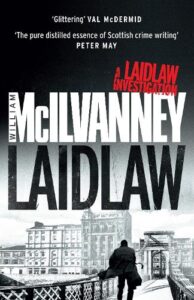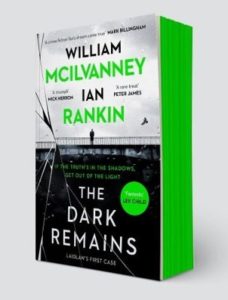Decades: Compiling the Ultimate Library with Ed James
It’s been two weeks since our last visit to the Decades Library and I’d like to apologise for the unexpected interruption – though someone did contact me to say their TBR had breathed a small sigh of relief! What happened? Well I was having a super busy week at the day job and got half way through Thursday when I realised it was actually Friday and that I’d totally lost track of the days.
Rather than cut someone’s week short I decided to hang off for a week before passing Ed James the Library curators hat.
As ever I am mindful that this could be your first visit to the Decades Library so I’ll quickly explain why we are here. I am assembling the Ulitmate Library of books. I want my Decades Library to only house books which are loved by other readers. Each week I am joined by a new guest and I invite them to add more books to my library shelves. I ask that when they make their selections that they follow two rules:
1 – You Can Choose Any Five Books
2 – You Can Only Choose One Book Per Decade From Five Consecutive Decades.
Easy! Or so it may seem but I haven’t tried to select my own five choices (yet) so I can’t speak from experience.
This week I am delighted to welcome Ed James to my Decades Library. I reviewed Ed’s new book The Turning of Our Bones earlier this week (it’s almost like I try to plan these things) it’s a real corker – great twist on a serial killer story. You can read my review here: https://grabthisbook.net/?p=7166 Over to Ed now – he’s why you’re here today….
 I’m Ed James, the writer of *checks notes* over forty police procedural books over the last eleven years. While I’ve worked with some publishers over that time (Headline, Bookouture and Thomas & Mercer), I’m now focused entirely on being an indie author, which gives me much greater control over what I write and publish.And what I do write and publish is a few series set in different locations. The DI Fenchurch books are set on the gritty streets of East London, and further afield, starring a detective whose own daughter was abducted. Vicky Dodds is a single mother solving crimes in Dundee and Tayside, where I grew up. Recently, I merged the eight-book Scott Cullen, three-book Craig Hunter and six-book Cullen & Bain series into Police Scotland, my attempt at a precinct series with multiple starring cops. And this year sees the launch of the DI Rob Marshall series, with THE TURNING OF OUR BONES on the 1st February marking my first new series in seven(!) years, with another three to come this year.
I’m Ed James, the writer of *checks notes* over forty police procedural books over the last eleven years. While I’ve worked with some publishers over that time (Headline, Bookouture and Thomas & Mercer), I’m now focused entirely on being an indie author, which gives me much greater control over what I write and publish.And what I do write and publish is a few series set in different locations. The DI Fenchurch books are set on the gritty streets of East London, and further afield, starring a detective whose own daughter was abducted. Vicky Dodds is a single mother solving crimes in Dundee and Tayside, where I grew up. Recently, I merged the eight-book Scott Cullen, three-book Craig Hunter and six-book Cullen & Bain series into Police Scotland, my attempt at a precinct series with multiple starring cops. And this year sees the launch of the DI Rob Marshall series, with THE TURNING OF OUR BONES on the 1st February marking my first new series in seven(!) years, with another three to come this year.
DECADES
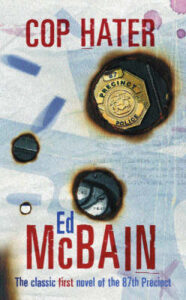 FiftiesCOP HATER by Ed McBainThere’s probably a massive article that could be written about this, but in my opinion this book is where the police procedural started. Sure, there were detective books before this and there were books about cops before this, but the genre – as we know it – roots all its tropes in this series. The 87th Precinct novels are set in Isola, as NYC as Gotham or Metropolis are, and had a huge influence on the TV flavour of police procedurals as well as selling a gazillion novels. The series is a tour de force, running to fifty-five books published between this beauty in 1956 until 2005. If I manage anything like that, I’ll still be publishing books in 2061!COP HATER is a sharp shock. A cop dies and Detective Steve Carella leads the chase to find the killer. As more cops die, McBain weaves in other POV characters, all fully fleshed out, and curiously incorporates genuine police documentation (forms, filled out for the fictional case). One of the ways this book is intriguing is in the way the hero, Carella, doesn’t appear in the second novel – what a way to show that this is an ensemble series. The writing is crisp and feels modern, with a few caveats. Also, the first twenty or so are pretty lean 30-40k jobs, so as easy to read in a sitting or two as a Maigret, say. And I’ve read them all.
FiftiesCOP HATER by Ed McBainThere’s probably a massive article that could be written about this, but in my opinion this book is where the police procedural started. Sure, there were detective books before this and there were books about cops before this, but the genre – as we know it – roots all its tropes in this series. The 87th Precinct novels are set in Isola, as NYC as Gotham or Metropolis are, and had a huge influence on the TV flavour of police procedurals as well as selling a gazillion novels. The series is a tour de force, running to fifty-five books published between this beauty in 1956 until 2005. If I manage anything like that, I’ll still be publishing books in 2061!COP HATER is a sharp shock. A cop dies and Detective Steve Carella leads the chase to find the killer. As more cops die, McBain weaves in other POV characters, all fully fleshed out, and curiously incorporates genuine police documentation (forms, filled out for the fictional case). One of the ways this book is intriguing is in the way the hero, Carella, doesn’t appear in the second novel – what a way to show that this is an ensemble series. The writing is crisp and feels modern, with a few caveats. Also, the first twenty or so are pretty lean 30-40k jobs, so as easy to read in a sitting or two as a Maigret, say. And I’ve read them all.
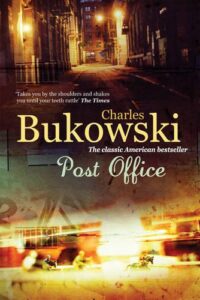 SixtiesPOST OFFICE by Charles BukowskiOkay, so this might’ve been published in the 70s but it was written in 1969 so I’m claiming that for this decade. Bukowski’s loosely fictional Henry Chinaski is a low-life. His life is grim and the people he associates with even grimmer. He’s an alcoholic and a womaniser. There is nothing redemptive about his story; he gets worse, if anything, and descends in the sequels. But the writing is so spare and propulsive that you want to revel in the misery of late 60s LA. Chinaski returned for all of Bukowski’s novels, save for the surreal PULP, and each has the same grim beauty as this.
SixtiesPOST OFFICE by Charles BukowskiOkay, so this might’ve been published in the 70s but it was written in 1969 so I’m claiming that for this decade. Bukowski’s loosely fictional Henry Chinaski is a low-life. His life is grim and the people he associates with even grimmer. He’s an alcoholic and a womaniser. There is nothing redemptive about his story; he gets worse, if anything, and descends in the sequels. But the writing is so spare and propulsive that you want to revel in the misery of late 60s LA. Chinaski returned for all of Bukowski’s novels, save for the surreal PULP, and each has the same grim beauty as this.
SeventiesLAIDLAW by William McIlvanneyOn this side of the Atlantic, McIlvanney’s LAIDLAW lay the roots for Tartan Noir. (Again, arguably, but let’s not have that argument just now, eh?) It’s all here – a driven detective in a gritty city investigating a brutal murder, but what McIlvanney does, that few others have done, is focus on the effect of the murder on the community. This is character over plot and the ripples of the plot throughout them, each rounded out and human. If you analyse it, you see that the titular hero only appears in a handful of the opening twenty chapters – compare that with the modern model of a victim/killer prologue and everything seen through the eyes of detectives, with some latitude for an additional victim to add a ticking clock. His lyrical flourishes are second to none, sharp and precise in their beauty. He could’ve written one of these a year and been rich, but he only finished another two (in 1983 and 1991 vs this in 1977 with a partial prequel completed during lockdown by Ian Rankin) and the success of Taggart on STV could easily have been his. But he chose another path.
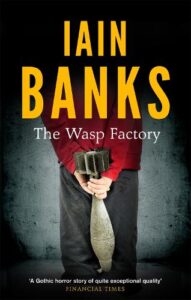 EightiesTHE WASP FACTORY by Iain BanksAn absolutely mind-bending debut from yet another author tragically no longer with us. In its short page count, THE WASP FACTORY creates a tiny world, isolated from the rest of Scotland but beautifully realised. One of the few authors who I read absolutely everything by, this and the CROW ROAD are truly national treasures. His sci-fi novels bend the mind in other ways. Curious and economical, debuts don’t come better than this.
EightiesTHE WASP FACTORY by Iain BanksAn absolutely mind-bending debut from yet another author tragically no longer with us. In its short page count, THE WASP FACTORY creates a tiny world, isolated from the rest of Scotland but beautifully realised. One of the few authors who I read absolutely everything by, this and the CROW ROAD are truly national treasures. His sci-fi novels bend the mind in other ways. Curious and economical, debuts don’t come better than this.
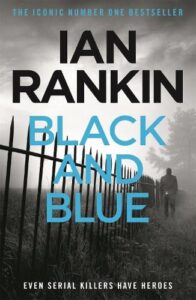 NinetiesBLACK AND BLUE by Ian RankinThis was the first police procedural novel I ever read. I picked up a copy my mum had got out of the library and didn’t set it down until I finished. Legend has it that this is Rankin’s breakthrough and you can see why – it’s got the highest of high concepts; Bible John, a real-life serial killer, comes back to hunt down a copycat. While its pages focus mainly on Rebus, that dour but drily witty detective who investigates while his private life is in tatters, the snatches from Bible John’s POV add a dimension that shows the high concept is met by high execution. I won’t spoil it here (even though it did come out almost 25 years ago…) but the twist ending is incredibly brave for a break-through novel and probably contributed to the success.
NinetiesBLACK AND BLUE by Ian RankinThis was the first police procedural novel I ever read. I picked up a copy my mum had got out of the library and didn’t set it down until I finished. Legend has it that this is Rankin’s breakthrough and you can see why – it’s got the highest of high concepts; Bible John, a real-life serial killer, comes back to hunt down a copycat. While its pages focus mainly on Rebus, that dour but drily witty detective who investigates while his private life is in tatters, the snatches from Bible John’s POV add a dimension that shows the high concept is met by high execution. I won’t spoil it here (even though it did come out almost 25 years ago…) but the twist ending is incredibly brave for a break-through novel and probably contributed to the success.
I’ve read four of Ed’s five selections and I loved each of them. If ever there was a sign that I need to read Charles Bukowski’s Post Office then this is it! Huge thanks to Ed for taking the time to make his selections, any time I get to feature an 87th Precinct book on the blog is a good day!
DECADES WILL RETURN
